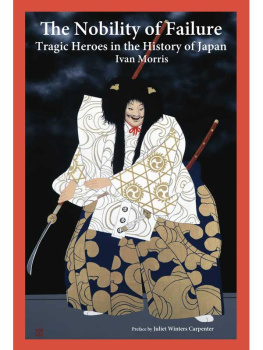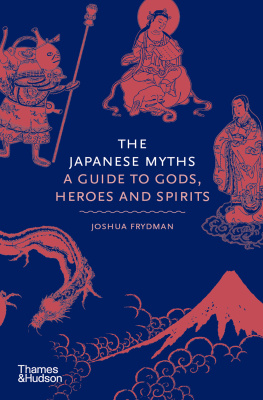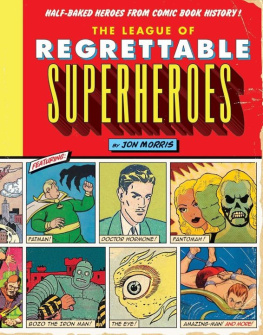Ivan I Morris - The nobility of failure: Tragic heroes in the history of Japan
Here you can read online Ivan I Morris - The nobility of failure: Tragic heroes in the history of Japan full text of the book (entire story) in english for free. Download pdf and epub, get meaning, cover and reviews about this ebook. year: 1975, publisher: Holt, Rinehart and Winston, genre: Art. Description of the work, (preface) as well as reviews are available. Best literature library LitArk.com created for fans of good reading and offers a wide selection of genres:
Romance novel
Science fiction
Adventure
Detective
Science
History
Home and family
Prose
Art
Politics
Computer
Non-fiction
Religion
Business
Children
Humor
Choose a favorite category and find really read worthwhile books. Enjoy immersion in the world of imagination, feel the emotions of the characters or learn something new for yourself, make an fascinating discovery.
- Book:The nobility of failure: Tragic heroes in the history of Japan
- Author:
- Publisher:Holt, Rinehart and Winston
- Genre:
- Year:1975
- Rating:3 / 5
- Favourites:Add to favourites
- Your mark:
- 60
- 1
- 2
- 3
- 4
- 5
The nobility of failure: Tragic heroes in the history of Japan: summary, description and annotation
We offer to read an annotation, description, summary or preface (depends on what the author of the book "The nobility of failure: Tragic heroes in the history of Japan" wrote himself). If you haven't found the necessary information about the book — write in the comments, we will try to find it.
Ivan I Morris: author's other books
Who wrote The nobility of failure: Tragic heroes in the history of Japan? Find out the surname, the name of the author of the book and a list of all author's works by series.
The nobility of failure: Tragic heroes in the history of Japan — read online for free the complete book (whole text) full work
Below is the text of the book, divided by pages. System saving the place of the last page read, allows you to conveniently read the book "The nobility of failure: Tragic heroes in the history of Japan" online for free, without having to search again every time where you left off. Put a bookmark, and you can go to the page where you finished reading at any time.
Font size:
Interval:
Bookmark:
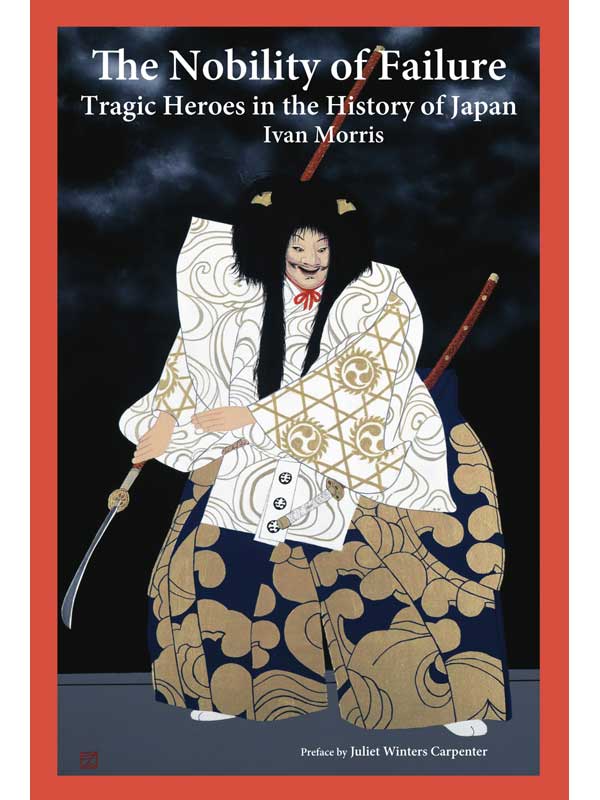
The Nobility of Failure
Tragic Heroes in the History of Japan
Ivan Morris
With a new preface by Juliet Winters Carpenter
Kurodahan Press 2014
Contents
Preface Juliet Winters Carpenter
Dedication and Acknowledgements
Introduction
Yamato Takeru th Century
Oh, Lone Pine Tree! Oh, My Brother!
Yorozu 6th Century
The Emperors Shield
Arima no Miko 7th Century
The Melancholy Prince
Sugawara no Michizane 9th and 10th Centuries
The Deity of Failures
Minamoto no Yoshitsune 12th Century
Victory through Defeat
Kusunoki Masashige 14th Century
Seven Lives for the Nation
Amakusa Shir 17th Century
The Japanese Messiah
shio Heihachir 19th Century
Save the People!
Saig Takamori 19th Century
The Apotheosis of Saig the Great
The Kamikaze Fighters 20th Century
If Only We Might Fall...
Notes
Bibliography
Contributors
Copyright
Maps
Japan (less Hokkaido)
Yamato Takerus Eastern Expedition
The Triumphant Campaigns of Minamoto no Yoshitsune
The Satsuma Rebellion
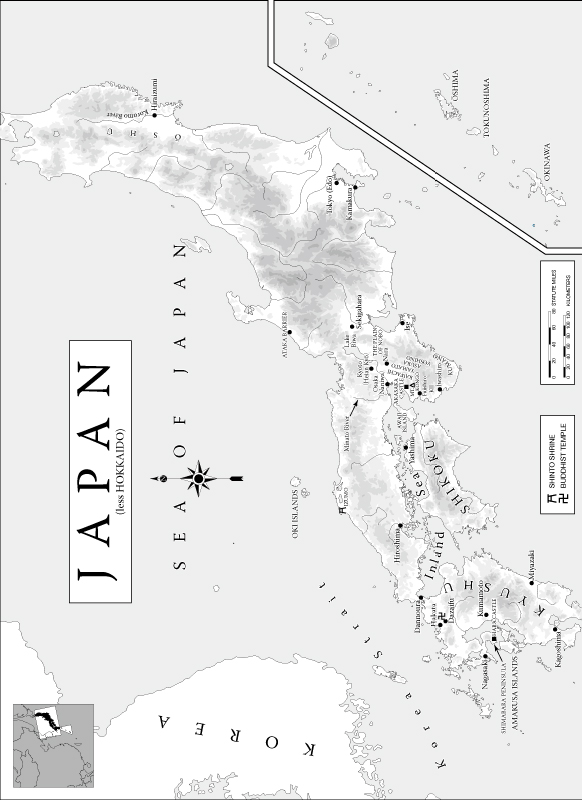
Preface
Years ago, I was sitting in a chapel on Doshisha campus at an entrance ceremony for new faculty and staff, listening to a Japanese pastor explain the essence of Christianity to people who would have to be supportive of it during their tenure at Doshisha, a university built on Christian principles. Something about love thy neighbor or turn the other cheek may have come up, but what I remember most vividly is that he described Christianity as a makeikusa a lost cause or losing battle. Though stunned by the pastors approach, at the same time, having read Ivan Morriss The Nobility of Failure , I was able to see how his words would strike a chord deep in the Japanese psyche. The invitation to join a worthy but unwinnable battleindeed, to give everything one has to it, knowing full well the outcome is doomedwould hardly appeal to a Westerner; but the faces in that chapel were transfixed. Not for the first time, I was grateful for the insights of this remarkable book.
Different as American and Japanese cultures and traditions may be, the admiration for heroic figures runs strong and deep on both sides of the Pacific. With characteristic erudition, eloquence, and occasionally wry humor, Ivan Morris lays out the Japanese preference for tragic or failed heroesthose who die for a lost cause, making up in sincerity and purity of purpose what they dismally lack in crowning success. He does this by telling the stories of ten men (or groups of menthe last chapter is about World War IIs doomed kamikaze pilots), all of whom made grand efforts that ended in colossal failure. Perversely (to the Western mind), their failure itself, the more total and abject the better, is what has endeared them to the Japanese. Legends of valor have sprung up around them; many of these heroes have taken on mythic proportions.
Of course failure in and of itself is not particularly noble, even in Japanese tradition. Many of these heroes are warriors; some are diehard traditionalists and others are daring rebels; still others are innocent victims. Often alone, often betrayed, they are eager for death, embracing their fate. What makes their lives (perhaps more significantly, their deaths) special is the honor, integrity, and strength of spirit they display as they follow their hard but chosen path to its inevitable end.
Morris tells each story with compelling sympathy, combining a historians search for context with a novelists eye for characterization and the telling detail. The stories begin in the misty past and proceed down the centuries to World War II. We are introduced to a romantic legendary hero who, after an ill-starred encounter with a malignant deity, dies alone in a field; an obscure warrior who, fighting in vain to keep out the foreign faith of Buddhism, chooses death rather than capture and is mourned only by his dog; a teenaged prince falsely accused of treason and strangled by his cousin; a government official and scholar who dies in lonely exile on a trumped-up charge, attended by a plum tree that uprooted itself and flew all the way to Kyushu to accompany its unfortunate master; a brilliant young military strategist who becomes a fugitive from his own brother and is forced to commit suicide by harakiri; a failed loyalist martyr who comes to epitomize devotion to the emperor, inspiring the later kamikaze martyrs; the teenaged leader of a failed Christian rebellion that ended in a horrific holocaust and the virtual eradication of Christianity from Japan; a quixotic samurai-philosopher who sought to rectify injustice and feed the starving, a noble enterprise that, as writer Mishima Yukio noted, ended in total failure; a defeated rebel samurai who ended his own life under the stigma of traitor, only to undergo posthumous apotheosis as the grand hero of the Meiji Restoration; and thousands of young pilots who volunteered to fly off to certain death in hopes of ending their lives in a blaze of glory, however useless.
Along the way, Morris includes a wealth of background drawn from firsthand accounts, contemporary documents, songs, and literary works ranging from poetry to kabuki and No. His explanations and analyses are thorough and engaging as well as incisive, making the book equally accessible for the general reader and the veteran Japanophile. Notes alone take up a good third of the book. Some of the most memorable parts of the text are poems and diary excerpts as, from first to last, Japanese warriors have expressed their deepest feelings in verse or highly charged prose. Here, from the first chapter, are lines written by Yamato Takeru as he faces a forlorn death:
On the Cape of Otsu
Directly facing Owari,
There you stand,
Oh, lone pine tree!
Oh, my brother!
Were you a man,
Oh, lonely pine,
I would gird you with a sword
I would give you robes to wear.
Oh, lone pine tree!
Oh, my brother!
And here is Saigo Takamori, defiant and ready to risk all for his country:
I am a boat cast on the rough water
For my countrys sake
If the winds blow, let them blow!
If the waves rise, let them rise!
The final chapter closes with a 31-syllable poem on the evanescence of life, written by the very man who organized the kamikaze attacks in the Philippines and sent so many young pilots to their deaths:
Today in flower,
Tomorrow scattered by the wind
Such is our blossom life.
How can we think its fragrance lasts forever?
In the end, does Morris succeed in making the Japanese predilection for failed heroes understandable to the Western mind, with its fixation on success? I think yes, he doesor perhaps I should say he comes as close as anyone could. Certainly the West is unlikely to emulate Japan on this score anytime soon. Morris dryly calls the Japanese preference for sad endings, heroes who never make it home, a departure from the monotony of mankinds central ideas. Yet he is never disrespectful, and illuminates the Japanese perspective with clarity, subtlety, and depth. He understands Japanese affection for the men he has singled out, at one point even tellingly referring to them as my heroes. It is good to remember that Morris was motivated to write the book partly, as he admits, to shed light on the sensational death of another failed hero, his friend Mishima, in 1972, just three years earlier. What lends even greater poignancy is the fact that he himself was to die of cancer in 1976, barely a year after the books publication.
Next pageFont size:
Interval:
Bookmark:
Similar books «The nobility of failure: Tragic heroes in the history of Japan»
Look at similar books to The nobility of failure: Tragic heroes in the history of Japan. We have selected literature similar in name and meaning in the hope of providing readers with more options to find new, interesting, not yet read works.
Discussion, reviews of the book The nobility of failure: Tragic heroes in the history of Japan and just readers' own opinions. Leave your comments, write what you think about the work, its meaning or the main characters. Specify what exactly you liked and what you didn't like, and why you think so.

